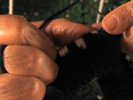Eye For Film >> Movies >> It's The Earth Not The Moon (2011) Film Review
This documentary - which runs to a bladder-straining three hours and 21 minutes - is the result of four years of filming and Gonçalo Tocha's intentions can't be described as anything less than ambitious. As we see him and his perpetual companion, sound engineer and composer Didio Pestana approaching the tiny Atlantic Island of Corvo, he tells us he plans to film "every person" (there are 450 inhabitants), not to mention "every rock, every bird, every tree, every..." well, you get the picture.
Filmed between 2008 amd 2011, Tocha and Pestana certainly have time to get to know the locals and it is clear that they quickly win them over with their collaborative approach - they are frequently seen showing people snippets of their film - and their self-deprecating humour. What follows is a series of vignettes detailing life on this isolated island on the tip of the Azores which, only a handful of decades ago, was often cut off from the rest of the world for months courtesy of its tempestuous seas. We watch as the elderly and wonderfully named Ines Ines knits Tocha a personalised, traditional whaler's hat, seeing it grow as his portrait of the island and its inhabitants builds.

All of life is here, from the birth of a calf, to a baby baptism, to the oldest man on the island and the slaughter of a couple of pigs, with Tocha and Pestana sometimes entering into dialogue about the history of the island or posing the odd philosophical question, such as why they have locks on their doors when there has never been a robbery. Individual direct-to-camera interviews are intercut with more meditative moments gazing out at waves crashing over the pier of the island's only town or listening to nighttime creatures call to one another with a cry that sounds for all the world like a demented Mr Punch.
This is an inquisitive rather than observational documentary, with many of the subjects all too aware they are being filmed. That Tocha elects to keep a moment when one sly old islander asks, "Do you want more lies?", and shots of the 'mechanism' of the documentary, such as people calling "action" or "cut" provides an interesting critical counterpoint, questioning the very method by which they are capturing the island. What emerges is a picture of a place where much history has been lost, often deliberately, but where the residents, though mindful of their past are always looking to the future.
That runtime, however, is an issue. It's hard to think much of its spirit would be lost by reducing it to something more managable for mainstream audiences. There's also a nagging question hanging over the age of most of the people Tocha talks to. There are clearly quite a lot of children on the island, yet none of them speak directly to the camera, and neither do many of child-bearing age. While Tocha is trying to explore ideas of history, this still feels like an oversight given the film's hefty length, although, as he would no doubt be first to contend, documentaries are sometimes as interesting for what they don't reveal as for what they do.
Reviewed on: 19 Jun 2012


















